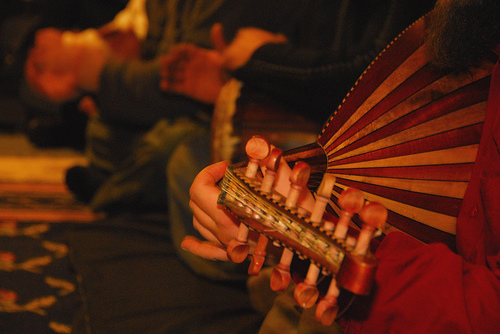Home Frank’s Blog Music and Spirituality
Music and Spirituality
Frank Fitzpatrick 11/16/2012

|
No time to read? Pick your language & press PLAY
Getting your Trinity Audio player ready...
|
WHY MUSIC – Part 9: Music and Spirituality

“Music is the mediator between the spiritual and the sensual life.”
– Ludwig van Beethoven
Although I was raised Irish Catholic, much of my deeper understanding of spirituality comes from studying more ancient teachings of the Vedas and my yoga practice. That said, the most consistent and dependable way I’ve found to connect to my inner voice, lift my spirits and bring myself back into balance has been music. Music has turned the most mundane and the most challenging moments of my life into deeply resonating human, and often indescribably divine, experiences.
People often ask me what kind of music is more spiritual: Is it Vedic mantras, Gregorian chant, devotional Bhajans, the great symphonies of Beethoven, traditional Gospel hymns, indigenous drums or even Rock & Roll? I usually respond by saying any music that helps re-connect us to our essence – to our inner and divine nature, is spiritual. For a teenager in Detroit or mother living in a smaller village in the Andes, the sound of that path is likely to look or, should I say, sound quite different. As fellow producer Karsh Kale once said, “For someone the sound of the bansuri is the sound of Krishna, while for somebody else, the sound of sub bass frequencies is a connection to spirituality.”

The spiritual nature of music cannot be defined by religion, culture or genre. Music precedes and transcends all of those frameworks. To even compare music and spirituality as if they were independent concepts feels a bit odd to me. Music is, at its essence, the sound of spirit. When created from the heart and with truth and pure intention, music is a spiritual expression of the most universal nature and the highest order.
“Music is a moral law. It gives soul to the universe, wings to the mind,
flight to the imagination, and charm and gaiety
to life and to everything.” – Plato
A couple years ago, I shared some time on the banks of the Ganges River in Rishikesh with a group of young Tibetan girls who had ventured down from their orphanage high atop the Himalayas. Having arranged the gathering the day before with the monk who ran the orphanage, I took the opportunity share a couple popular songs with the girls. We all relished with joy in the hot India sun as I played guitar and they all sang along to the popular refrains of Paul McCartney’s “Let it Be,” Ziggy Marley’s “Love is My Religion,” and Snatam Kaur’s “Ananda.” Was this experience of singing these modern day mantras any less spiritual for them then learning the Tibetan chants taught to them at the orphanage? From the smiles on their faces and light radiating from their eyes as they sang their hearts out, I’m not so sure.

“There is nothing in the world so much like prayer
as music is.” – William P. Merrill
Let me attempt to show this relationship between music and spirituality on a more fundamental level by first examining the meaning of “spiritual.” The New Oxford American Dictionary defines spiritual as “relating to, or affecting the human spirit or soul as opposed to material or physical things.” As we go back further in time, spirit comes from Latin spiritus – which is most simply translated as breath, but also identified with courage, vigor and soul. The distinction between soul and spirit was first separated in Christian terminology, with spirit being the “seat of emotions.” A more contemporary definition of spirit might also include “the essential nature of something.”
Whatever meaning one chooses for spirituality, I believe there are direct correlations to each in the nature of music. Music is essential to human life and an integral part of our development as individuals and as a species. Like breath, music has rhythm, tension and release. One might even claim that the sound of breath, or the waves of the ocean are musical expressions of life. The beginning of the universe, according to modern science, was created by sound – the Big Bang. The ancient myth of the goddess Voce claims that she created the world by singing it into existence. Few things in life have the ability to directly shape or shift our emotional state than music.
“There are certain things that have universal attributes, like music. Something of greater magnitude is conveyed by them. They connect us with the universal
storehouse of life and knowledge.” – Swami Paramananda
On that same trip to Risheskesh, a group of us had been eagerly awaiting the opportunity for Swami Vishwananda to share his insights on the great teachings of Bhakti Yoga. Finally, late one night he told us all to follow him back to that spot by the side of the Ghanges. His followers took out their instruments and began to play, chant, and dance in the moonlight, inviting us to follow suit as they celebrated their way into an ecstatic state. After an hour or so, Vishwananda and his musicians packed up as the Swami turned us and said, “Now you know the true meaning of Bhakti.”
“Music cleanses the understanding, inspires it, and lifts it into a realm which
it could not reach if it were left to itself.” – Henry War Beecher

On another occasion, I took Alec – a retired British gentleman who had spent his whole life attending masses at an extremely conservative Church of England, to an Easter celebration at a Southern Baptist church in South Central Los Angeles. I wanted him to hear the choir and the amazing artists who regularly joined the services at this particular church. More than having an eye-opening or entertaining experience, he was blown away. The whole congregation was singing, clapping, and dancing along while the choir and soloists alike sang as if possessed by the music as it channeled through them. Having never experienced anything like it in his life, Alec told me afterward that his whole life would have been different had his church experience been so filled with music, joy, and passion rather than the dry, extremely controlled services he had come to known.
“Music should be healing; music should uplift the soul; music should inspire.
There is no better way of getting closer to God, of rising higher towards the spirit,
of attaining spiritual perfection than music, if only it is rightly
understood.” – Hazrat Inayat Khan
Although nearly all known religions of the world include music in their expressions and rituals, I prefer not to limit our definition of spirituality to religion. I do recommend, however, bringing music into whatever spiritual practice or religious rituals you do follow. For years I would separate my morning meditation practice from practicing my instrument, often running out of time for one or the other. One day I brought my guitar and my original melodies to my morning meditation ritual and discovered both practices, and my own sense of connection, were greatly enhanced by the union.
“Music is the easiest method of meditation. Whoever can let himself dissolve
into music has no need to seek anything else to dissolve into.” – Osho
I won’t claim that all music is spiritual, or rather, created and intended for the benefit of the human spirit. It would be great if it were. As Ravi Shankar put it when asked if music is essentially spiritual: “The highest form in music is spirituality.” When it is, the effect on us – our thoughts, our emotions, our subconscious, and even our physical well-being can be quite profound. I, like Fela Kuti, Shakar and many others, believe it is the responsibility of the creators of music to recognize their influence and express themselves with truth, consciousness, and integrity.

“Beautiful music is the art of the prophets that can calm the agitations of the soul; it is one of the most magnificent and delightful presents God has given us.” – Martin Luther
Music is one of our most powerful gateways to connect to our spiritual nature – our divine source – the unseen, as well as to the universe around us and those other divine beings that inhabit it with us. I know of no other medium that can transport us as immediately, on all levels of our existence, beyond the limits of our intellect and physical body to a higher, often blissful and inexplicable state. Music has the unique ability to transform us independently of our thinking mind, to a place uninhibited by the judgments, doubts and fears that too often dictate the narration of our thoughts and self-limiting beliefs.
“Again, when the mind is doubtful, when the mind drinks deep of doubt-poison,
the senses have no capacity to inject faith into the mind. Here also music
comes to the rescue.” – Shri Chinmoy
Just as music has helped rescue me from some of the lowest points of my life, it has been the blissful soundtrack for my many of my most loving memories and the rhythm that continues to propel me forward. For me, spirituality and music will never be separated. The more music continues to awaken my higher aspirations and light the path of my inner journey, the higher I am inspired to reach and the deeper I long to delve into those realms of the magical unknown that awaits me. If words are the limited language of my mind, music is the limitless calling of my soul.
“I still believe in the things I can’t see… I believe in the things I can feel:
Music, Love, and God.” – Lina Loy
View this article on Huffington Post.
To view the full Why Music series click here.
I’m here to help YOU create a better world, inside and out.
Contact Me© 2025 Frank Fitzpatrick Website by AllHereIndia












